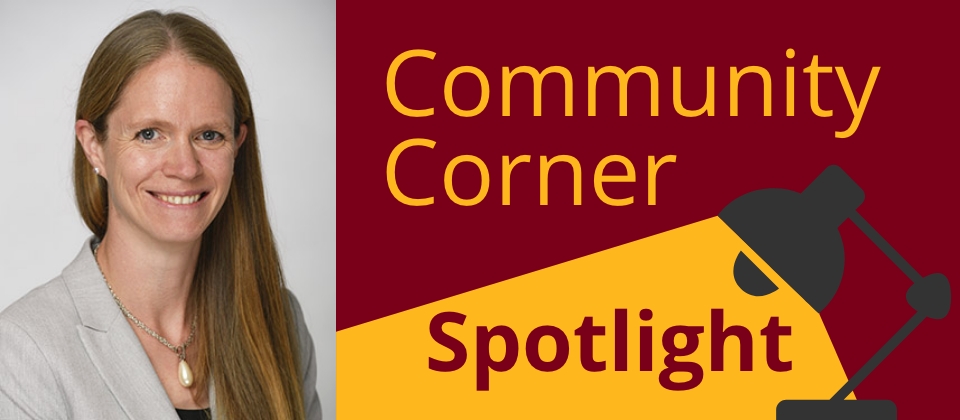
Dr. Jenna Marquard
This month's spotlight is on: Dr. Jenna Marquard Professor and Chair of the Population Health and Systems Cooperative in the School of Nursing!
What are your current research interests?
I am interested in how we can combine patient-generated and clinical data to help improve the health and wellbeing of patients. This could mean using a single individual’s data to improve their own health and healthcare. Or, it could mean analyzing these holistic datasets to generate insights about how we should care for larger populations of patients.
My expertise is in the human-technology interactions necessary to make this vision a reality. We need to make sure patients and clinicians can acquire and share high-quality data as effortlessly as possible. We also need to make sure we provide information and insights to patients and clinicians in useful and easy-to-use ways. The human-technology interaction side of digital health is incredibly challenging, with digital health tools discarded by patients or clinicians if they are viewed as difficult to use or not useful. When I work on teams with technical experts, I hope to ensure their tools are adopted and used, resulting in improved health outcomes.
How do you define Data Science?
I view the goal of data science as an approach where data are collected and analyzed in order to generate meaningful insights that are used to improve processes, decisions, and outcomes. Given my background in health informatics, my research focus on human-technology interaction, and my current role as one of the Nursing Informatics faculty within the School of Nursing, I see health informatics as the acquisition, storage, retrieval, and use of health care information supported by people using innovative tools to complete processes that improve outcomes, some examples of these being:
- People: Healthcare professionals, patients, consumers, lay caregivers
- Tools: electronic health records (EHRs) and clinical decision support systems (CDSS), mobile health (mHealth) technologies, health information exchanges (HIEs)
- Processes: chronic disease management, acute care, recovery from acute care
- Outcomes: improved health outcomes, enhanced patient care, better communication and collaboration, and reduced costs
Can you share an interesting or surprising result you’ve found in your data?
In almost every project I have completed over the past decade, we find that patients and clinicians are shown more information than they need, making it difficult to find and use the information they do need – whether in EHRs or mHealth technologies. We see this in both our quantitative and qualitative research. Even when I am involved in system design, I find it difficult to remember that just because we have data does not mean we need to display it. This becomes increasingly important the more data we have.
Are there any interesting new tools or libraries you or your students have been using?
A PhD student dusted off one of our eye-trackers last year, after several years of not using it. With the eye tracker, we can more objectively understand individuals’ information search patterns when they use technology. Not surprisingly, clinicians in that study are ignoring large amounts of information and having trouble finding what information they need.
What are you most excited about in the field of data science in the next 5 years?
Within the digital health space, I continue to be encouraged by the growing desire for usable data-science-driven technologies. I am seeing a growing community of researchers focused on human-technology interaction within health informatics, increasing implementation of health system-academic partnership findings, and tools that allow for more design freedom within the EHR. These innovations will make the pioneering work of data science methodologists even more impactful.
Catchup on the Latest News at DSI
Dr. Rachel Hardeman - One of TIME100's Most Influential People in the World
Dr. Rachel Hardeman, the founding director of the University of Minnesota's Center for Antiracism Research for Health Equity (CARHE), has been named one of TIME100's Most Influential People in the World for 2024.
